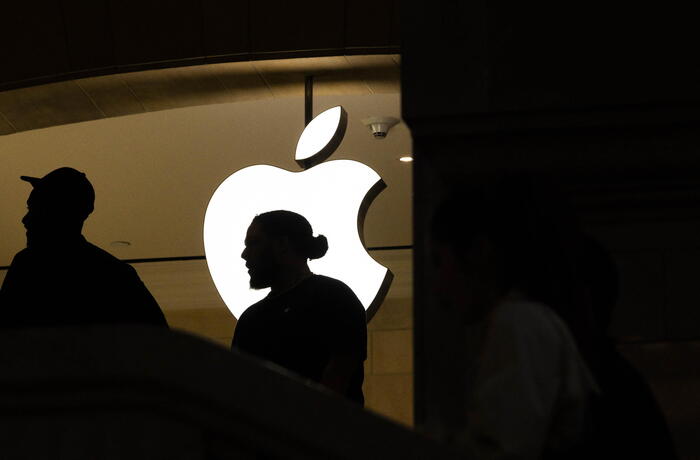Admittedly: the name of the department may sound a bit yesterday.
But the SPIEGEL documentary is essential for SPIEGEL's credibility, especially in the current times when fake news and conspiracy theories are spreading rapidly.
More than 50 highly specialized fact checkers check and support the work of the SPIEGEL editorial team.
They check finished articles before they are published so that every word is correct, research answers to almost every question, no matter how absurd, and maintain an archive in which millions of documents are now stored and accessible.
No other media company in Germany can afford such a well-equipped documentation team.
If you want to know details about the department and its work and the lessons it learned from the Relotius scandal, you can read about it here.
If you want to know more about some of our fact checkers and how you actually get this job, what it is and what training you need for it - just read on.
Enlarge image
Andreas Meyhoff
Photo: Philipp Meuser / DER SPIEGEL
Andreas Meyhoff, 52, specialty: sport
»I come from East Westphalia and - despite taking physical education with handball world champion Jimmy Waltke - I've been a club soccer player since I was seven (stations: VfL Frotheim, SC Sternschanze). Two games in 1982 made a big impression on me at the age of twelve: an intoxicating 5-0 by Arminia Bielefeld against Borussia Mönchengladbach, which I saw with my father in the stadium, and the so-called Night of Seville on television. After this World Cup semi-final between Germany and France, I realized that sport is not just about winning, but sometimes also about politics. Toni Schumacher's serious foul on Patrick Battiston caused anti-German resentments to flare up in France because Schumacher had behaved so indifferently.
After studying social and economic history and doing my doctorate, I came to SPIEGEL in Documentation in February 2001, where I soon specialized in sports.
SPIEGEL regards sport as a social phenomenon: We shed light on the stories behind the competitions.
That's why I research biographies, economic figures, medical, legal or historical backgrounds every week, check documents, clarify contradictions and try to close knowledge gaps.
Sometimes under time pressure, sometimes for weeks when it comes to doping and sexual abuse in sport, questionable business of officials or financial tricks from football professionals. "
Enlarge image
Charlotte Weichert
Photo: Philipp Meuser / DER SPIEGEL
Charlotte Weichert, 40, specialty: medicine
“I'm a real Northern Lights - and still have to get used to the four to zero. I was born in Hamburg, but grew up in a village in Schleswig-Holstein. I studied medicine in Lübeck, after which I was able to complete my specialist training in Hamburg in the most exciting of all fields - neurosurgery! Despite the fascination for this profession, in 2020 I decided, also because of my two small children, to no longer stand in the operating room, but to bring my medical knowledge and many years of clinical experience to journalism. Of course, I'm currently doing a lot of research and articles on the corona pandemic. In addition, I have been dealing with medical ethics for a long time,I trained as an ethics consultant in the healthcare sector and am currently familiarizing myself with the field of media ethics. Above all, I think the question of the media's responsibility as science communicators is important. "
Enlarge image
Marc Theodor
Photo: Philipp Meuser / DER SPIEGEL
Marc Theodor, 36, subject: geology, climate change
I've been in SPIEGEL's scientific documentation for four and a half years.
For me, the special thing about verifying texts is the unbelievable thematic breadth that is covered.
For me, as a doctor of geology, this ranges from earthquakes to mining to climate change.
I'm also interested in archeology, especially since I come from the Schliemann town of Neubukow in Mecklenburg.
In addition to reviewing journalistic articles, I regularly offer excursions for geosciences students from Hamburg, for example in the Czech Republic;
I explain to them what Europe looked like more than 400 million years ago.
As a new father, I currently hardly have any time for other hobbies, such as archery.
Regina Schlueter, 55, subject: monetary policy, labor market and financial markets
“I graduated from high school in Goslar at the same grammar school as Sigmar Gabriel.
After school I applied for an apprenticeship as a publishing clerk and first went to Bauer-Verlag.
This was followed by a degree in economics and the Spanish language in Hamburg and Salamanca and a doctorate on an economist in the Third Reich - he changed from a staunch Nazi to a critic of the regime and was executed in 1944.
In October 2000 I started to work in the business documentary of SPIEGEL.
Deepening current topics, exchanging ideas with colleagues and dealing constructively with the editors - all of this makes my work so interesting every week. "
Julia Lange, 36, Subject: USA
»Facts matter - in times of ubiquitous disinformation on the Internet, being able to contribute to fact-based, critical reporting is my daily incentive. And a reason for a fundamentally optimistic feeling at work. I was born in Hamburg and grew up bilingually with a Russian mother from Saint Petersburg and a German father from Ostwestfalen-Lippe. After studying American Studies, English and Law in Hamburg and Oxford, I did my doctorate in American Studies and examined the way German-American organizations deal with the memory of the Holocaust for my work. For several years I lived and researched on the east coast of the USA; later I was a lecturer in American Studies at the University of Hamburg. At SPIEGEL, my focus is on US reporting. "
Bertolt Hunger, 54, subject: internal security
»After finishing school, I went from a small town in the Harz Mountains to the largest accessible metropolis - that was Hamburg in West Germany - to study politics and computer science. As an intern, freelancer and volunteer at NDR, I got to know a dozen editorial and press offices. I've been with SPIEGEL since 1996, where I ride my bike every day. Since 2004 I have been responsible for internal security in Germany, i.e. dealing with the RAF, the NSU, Islamism, the police and the protection of the constitution. About 40 percent of my work is on other topics, from the history of the railroad to pop music. Whenever I notice something interesting, I'll write an article myself - for example, about what the invention of the railroad has to do with the invention of the Internet.Why do I like to work here? Nowhere have I found more competence. The working conditions are first class. And perhaps most importantly, journalism has a duty of care and needs credibility in order to perform its control function. We contribute to this. "
Zahra Akhgar, 33, subject: Islam and the Middle East
»When I decided to study Islamic Studies in the 2010s, I was amazed - in my home country Lower Saxony, but above all from my family in my native Iran (» senseless orchid subject «,» breadless art «).
To be honest, I did not see it coming that since 2015 I have been able to contribute my knowledge of Islamic law, religious groups such as Ismailis, Alevis and Ibadites, and hybrid political systems like Iran to SPIEGEL.
What I like about my work is the sometimes heated but always constructive discussions with the editors, the opportunity to exchange ideas with the other documentation experts to verify a wide range of topics, and the research work in different languages. "
Enlarge image
Heiko Buschke
Photo: Philipp Meuser / DER SPIEGEL
Heiko Buschke, 58, subject: contemporary history / politics
“As Fischkopp, who grew up in Bremen, I ended up in Göttingen after school, where I studied history and political science. Later I did my doctorate on the relationship between right-wing extremism, the Nazi past and the press in the Adenauer era - because I wanted to combine the topics of history and journalism. I have been part of the SPIEGEL documentation since 1992 and, as a historian in the Germany department, I oversee all relevant topics - whether it is the history of National Socialism, the founding of the Federal Republic, the end of the GDR or the crimes of the Stasi. I particularly appreciate the fact that contemporary history has always been a core competence of SPIEGEL and that it has often initiated important social debates about Germany's past. That this will continue to be the case in the future,is both my incentive and my daily business. "
Janine Große, 32, specialist area: environmental policy and energy management
»I am an economist, do environmental economics in Uppsala, Sweden;
Tartu, Estonia and Frankfurt an der Oder has been studying and working at SPIEGEL since 2018.
I grew up in Lower Lusatia between lignite mines and Spreewald cucumbers.
How did I get to SPIEGEL from there?
It's a very long story.
What I like about SPIEGEL is that people with a lot of knowledge work there.
So while working on the different articles you always learn something new, including things that you never thought you would ever want to know. "
Enlarge image
Carsten Hellberg
Photo: Philipp Meuser / DER SPIEGEL
Carsten Hellberg, 55, subject area: music
»I was born in Hamburg, studied modern history and philosophy and made music for a long time.
I like working in documentation because you sit in the second row, you have to be precise and you can professionally express your know-it-all tendency.
Music (and soccer) are my absolute passions.
And the fact that I have been responsible for the former in our department at SPIEGEL for almost 23 years still seems like a gigantic coincidence to me.
ॐ नमः शिवाय «
Imko Haan, 31, Subject: France, EU, Sub-Saharan Africa
»In my work in international documentation, I deal particularly intensively with the various trouble spots in Africa, but I am also responsible for the EU and France. I've been with SPIEGEL for two years in the international documentation. I grew up in the district of Cuxhaven. After studying in Osnabrück (European Studies), Paris (Sciences Po) and London (King's College), I first worked for the European Commission in Brussels and then got into journalism. When at the end of the day I have the feeling that I have contributed to the quality of the lyrics, that fulfills me a lot. In addition to research and fact checking, I am also enthusiastic about language and the search for the best formulation. I'm also interested in foreign cultures.One of my most memorable trips was to Japan at the beginning of 2014: I cycled past smoking volcanoes, hitchhiked to explore the south of the country and got to know the culture around hot springs (onsen). "
Claudia Stodte, 57, subject: Islam and the Middle East
"What are you studying?" Many asked me, irritated, amused or horrified in the eighties. Some simply believed they had misheard. ›Islamic Studies? And what are you going to do with it? '' Let's see, 'I replied. After my doctorate, ›mal peep‹ turned into almost 25 years of work at SPIEGEL, which in 1997 was looking for a new person for its documentation: Islam and the states around the Middle East. Since then I have been researching topics such as the war in Syria, the nuclear treaties with Iran, the women's movement in Saudi Arabia, the election marathon in Israel, the emergence of Islam, the caliphate in Cordoba or the question of which Islamic headscarf is called what ... I also trained the Hamburg police on intercultural issues for a while. What I like about my job:that I have fantastic colleagues and go home a little smarter every day. What do I dislike? That peace in the Middle East is still a long time coming and that the issues are sometimes exhausting. "






/cloudfront-eu-central-1.images.arcpublishing.com/prisa/ACVHT3PX6JCUJNS4ST4ZY7FO6I.jpg)


